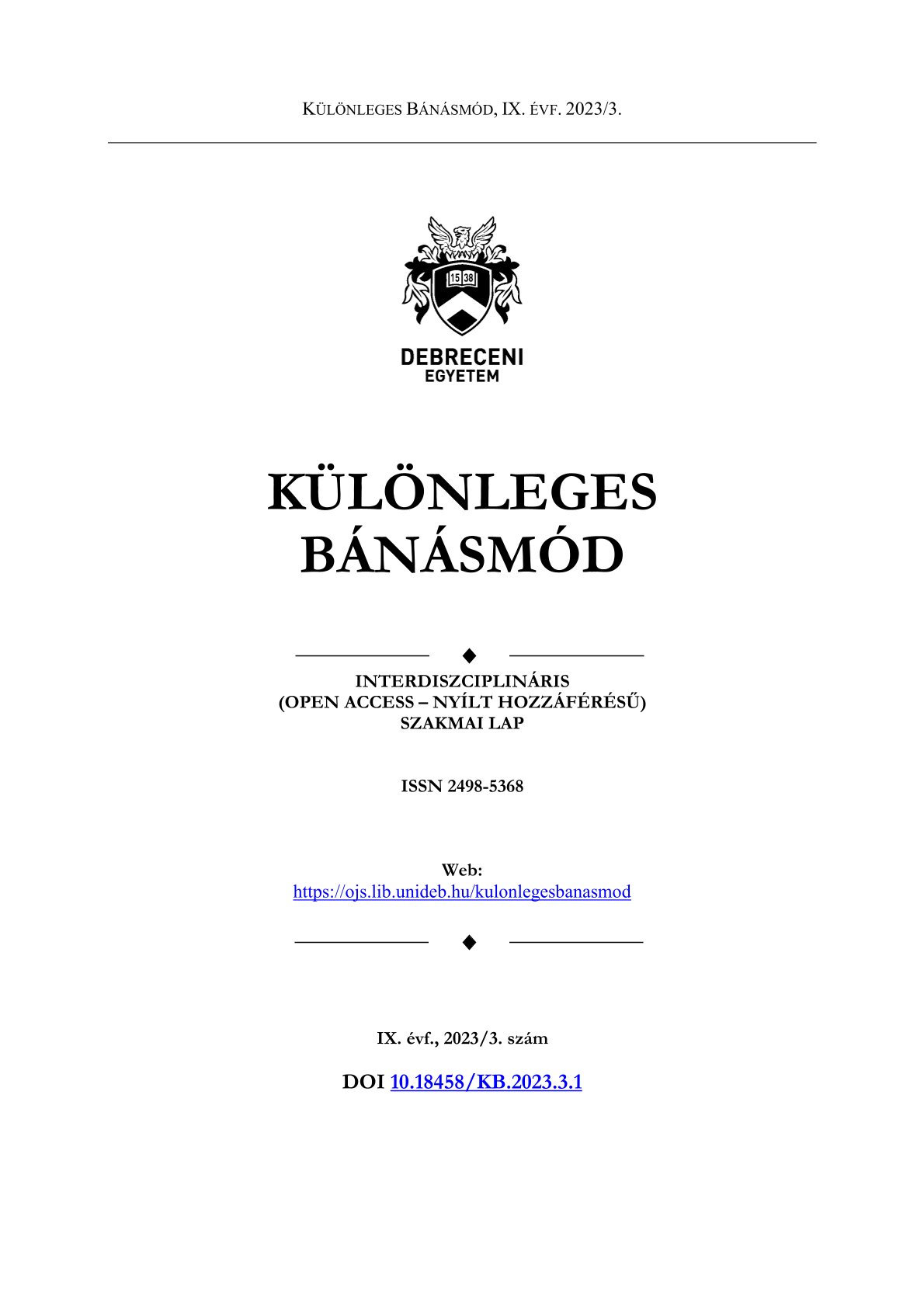A TANULÓK ISKOLAI TELJESÍTMÉNYÉT BEFOLYÁSOLÓ SZÜLŐI TÉNYEZŐK ILORIN METROPOLISBAN, KWARA ÁLLAMBAN
Szerzők
Megtekintés
Kulcsszavak
Licenc
Copyright (c) 2023 Shuaib Abolakale Muhammed (Ph.D.), Mulikat Ladi Abdulkadir Mustapha (Ph.D.), Awoyemi Alfred Olatayo (Ph.D.)

This work is licensed under a Creative Commons Attribution-NonCommercial-NoDerivatives 4.0 International License.
Hogyan hivatkozzuk
Absztrakt
Háttér és cél: a tanulmány célja annak felmérése, hogy hogyan alakítja a szülői befolyás a diákok tanulmányi teljesítményét Kwara állam fővárosában, Ilorinban. Általánosan ismert tény, hogy ahhoz, hogy a tanulók teljes mértékben kitudják használni az oktatás előnyeit a szüleiknek teljes mértékben támogatniuk kell őket. Ugyanakkor egyre több kutató fejezi ki aggodalmát a diákok alacsony iskolai teljesítménye miatt. Minta: Ilorin városának összes általános iskolai tanára alkotta a vizsgálat alapsokaságát (n=215). A minta kiválasztásához egyszerű véletlenszerű és szelektív mintavételi módszereket alkalmaztunk. Módszer: a kutatás során vegyes módszert alkalmaztunk ( 200 fő kérdőívet töltött ki, 15 fő interjún vett részt). Az adatokat "A gyermekek iskolai teljesítményét befolyásoló szülői tényezők kérdőív" (PFISAPQ) segítségével gyűjtöttük össze. A vizsgálat során figyelembe vett tényezők a következők voltak: nem, életkor, iskolai végzettség és a tanítási tapasztalatok éveinek száma. A demográfiai adatokat százalékban fejeztük ki, és a két nullhipotézist a kétirányú ANOVA statisztikai eszközzel teszteltük 0,05-ös szignifikanciaszinten. A kutatási kérdések elemzéséhez átlag- és rangsorelemzést alkalmaztunk, majd tematikus elemzéssel elemeztük a fő kutatási kérdéseket alátámasztó további kérdéseket. Eredmények: az eredmények azt mutatták, hogy többek között a szülői részvétel, a szülői felügyelet, a tanórán kívüli tevékenységekben való szülői részvétel, a szülői tanulmányi háttér, a szülői érdeklődés az oktatás iránt és a szülő-gyermek kapcsolat az elsődleges tényezők, amelyek pozitívan befolyásolják a gyermekek tanulmányi sikerességét. Jelentős különbségek mutatkoztak a tanulók iskolai teljesítményét befolyásoló szülői tényezőkben az általános iskolai tanárok nem, életkor, iskolai végzettség és a tanításban eltöltött évek alapján is. Az eredmények alapján megfogalmazható, hogy a szülőket ösztönözni kell arra, hogy jobban vegyenek részt a gyermekek tanulmányi tevékenységeiben, hogy a gyermekek jobban tanuljanak és maximálisan teljesítsenek az iskolában.
Hivatkozások
- Adeyemi, A. M. & Adeyemi, S. B. (2014). Personal factors as predictors of students’ academic achievement in colleges of education in South Western Nigeria. Academic Journal, 9(4), 97-109. DOI 10.5897/ERR2014.1708
- Bordens, K. S. & Abott, B. B. (2002). Researcher design and methods: A process approach (5thed.). New York: McGraw-Hill.
- Bornstein, M. H. (Ed.). (2002). Handbook of parenting: Practical issues in parenting (2nd ed.). Mahwah, NJ: Lawrence Erlbaum Associates, Inc.
- Bruns, B., Mingat, A., & Rakotomalala, R. (2003). Achieving universal primary education by 2015: A chance for every child. Washington, D.C: The World Bank.
- Chance, P. (2003). Learning and behavior (5th ed.). Australia: Wadswath Publishing.
- Durand, T. M. (2010). Latina mothers' cultural beliefs about their children, parental roles, and education: implications for effective and empowering home-school partnerships. Urban Review: Issues and Ideas in Public Education, 43(2), 255-278. DOI 10.1007/s11256-010-0167-5
- Egunsola, A. O. E. (2014). Influence of home environment on academic performance of secondary school students in agricultural science in Adamawa State Nigeria Journal of Research & Method In Education (Iosr- Jrme) E-Issn: 2320–7388, P- Issn: 2320–737x 4 (4). 46-53. DOI10.9790/7388-04424653
- Emeka, J. (2020). Family environment and academic achievement of some secondary school student. Calabar: Umeh Publishing.
- Ezenwafor, J. I. & Amobi, S. C. (2016). Extent parental and student-related factors affect students’ academic performance in business subjects in secondary schools in Awka education zone. European Journal of Education Studies, 2(4), 44-54. DOI 10.5281/zenodo.62062
- Federal Republic of Nigeria. (2013). National Policy on Education (6th ed.). Lagos, Nigeria: Nigerian Educational Research and Development Council (NERDC).
- Goye, H. (2007). Parental participation in pupils' homework in Kenya: In search of an inclusive policy. Nairobi: Act press.
- Hay, I., & Ashman, A. F. (2003). The development of adolescents’ emotional stability and general self-concept: the interplay of parents, peers, and gender. International Journal of Disability, Development, and Education, 50, 1, 78-91. DOI 10.1080/1034912032000053359
- Jeynes, W. H. (2002). Examining the effects of parental absence on the academic achievement of adolescents: The challenge of controlling for family income. Journal of Family and Economic Issues, 23(2), 56-65. DOI 10.1023/A:1015790701554
- Jeynes, W. H. (2005). Effect of parental involvement and family structure on the academic achievement of adolescents: Marriage and Family Review. 37(3):99-116. DOI 10.1300/J002v37n03_06
- Kentli, F. D. (2012). Parental influence on academic success: A case study on a private high school in Turkey. International Journal of the Humanities, 6(5), pp. 65-70.
- Koki, S., Lee, H., & Educational Resources Information Center (U.S.). (2008). Parental involvement in education: What works in the Pacific. Honolulu: Pacific Resources for Education and Learning.
- Michael K., & Karthik, M. (2004) Measuring and Understanding Teacher Absence in Indonesia.” unpublished draft. World Bank, Washington DC.
- Michael K., & Karthik, M. (2004) Measuring and Understanding Teacher Absence in Indonesia.” unpublished draft. World Bank, Washington DC.
- Momen F. & Amiri S.H (2008). The relationship between parent’s child rearing styles and incidence of anorexia nervosa among 14-17 year old female adolescents in (Isfahan) Persian. Journal of family research, 12, 775-89.
- Muola, H. (2010). A study of the relationship between academic achievement motivation and home environment among standard eight pupils Educational Research and Reviews. 5 (5). 213-217.
- Nkechi, O., Umemetu, M. &Ogbonnaya, N. O. (2013). Supervision and inspection for effective primary education in Nigeria: Strategies for improvement. Academic Research International, 4(4), 586-594.
- Ntitika, J. L. (2014). Parental characteristics influencing students’ academic performance in public secondary schools, In Isinya District, Kenya. Unpublished M. Phil. University of Nairobi.
- Obidike, I. V. (2012). Towards effective early childhood care and education programme in Nigeria. Journal of Teacher Perspective, 6(3), 507-513.
- Sampson, D. (2004). Academic performance, mental health and school factors. Retrieved on July 3, 2008 from www.mentalhealth.com/2321/htm.
- Shittu, M. R. (2004). Socio economic determiners of academic performance of secondary school students in Nigeria. Unpublished B.Ed project, University of Ilorin, Ilorin.
- Sirin, S. R. (2005). Socioeconomic status and academic achievement: A meta-analysis review of research. Rev Educ Res, 75,417-53. DOI 10.3102/00346543075003417
- UNESCO (2001). Primary Education: The core of development and progress. UNESCO Education Webmaster.


 https://doi.org/10.18458/KB.2023.3.35
https://doi.org/10.18458/KB.2023.3.35